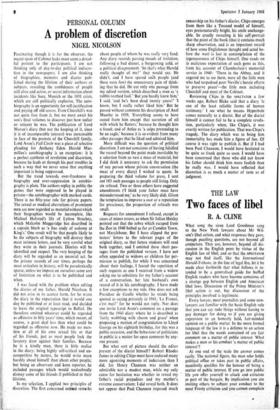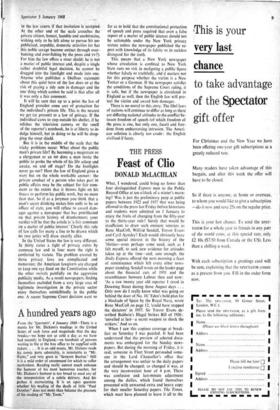Two faces of libel
THE LAW R. A. CLINE
What song the siren Lord Goodman sang to the New York lawyers about Mr Wil- son's libel action, and what responses they gave, though puzzling questions, are not beyond all conjecture. They are, however, beyond all dis- cussion in the English press by virtue of the English law of libel, and so that the SPECTATOR may not find itself, like the International Herald-Tribune, in the line of legal fire, let it be made clear forthwith that what follows is in- tended to be a generalised guide for baffled English readers who have become conscious of a strange gap between English and American libel laws. Discussion of the Prime Minister's libel action is out, but discussion of the principles involved is legitimate.
Every lawyer, most journalists and some non- lawyers are familiar with the basic English rule that you can say rude things without having to pay damages for doing so if you are giving expression to an honestly held, fair-minded opinion on a public matter. In the more formal language of the law it is a defence to an action for .libel that the words contained of are fair comment on a matter of public interest. What mates a man or his conduct 'a matter'of public interest'?
At one end of the scale the answer conies easily. The national figure, the man who holds political office or takes part in public affairs, manifestly qualifies for the honour of being a matter of public interest. If you go into public life you offer yourself to attack and criticism as part of the bargain. By implication you ate inviting others to subject your conduct to the most Frosty criticism and you cannot complain in the law courts if that invitation is accepted. At the other end of the scale crouches the private citizen, honest, humble and unobtrusive, wishing only to be left alone to'pursue his un- publicised, unpublic, domestic activities (or has this noble savage become extinct through over- hunting and over-fishing by the press and Tv?). For him the law offers a stout shield; he is not a matter of public interest and, despite a single rather doubtful legal decision, he cannot be
dragged into the limelight and made into one. - Anyone who publishes a libelous statement about this quiet-hero of the law does so at the -risk of paying a tidy sum in damages and the one thing which cannot be said is that after all
it was only a fair comment.
It will be seen that up to a point the law of England provides some sort of protection for the individual's private life. This is the nearest we get -(at present) to a law of privacy. If the individual.cares to step outside his shelter, if he relishes the • television camera or the smell of the reporter's notebook, he is at liberty to in- dulge himself, but in doing so he will be drop- ping the stout shield.
But it is in the middle of the scale that the tricky problems occur. What about the public man's private life? By becoming a magistrate or a clergyman or an MP does a man invite the public to probe the whole of his life asleep and awake, on and off stage? Do the footlights never go out? Here the law of England gives a wary but on the whole workable answer: the private conduct of a person who takes part in public affairs may be the subject for fair com- ment to the extent that it throws light on his fitness to perform`his public work, but no more than that. So if as a juryman you think that a man's secret drinking makes him unfit to be an Officer of State, you will refuse to award dam- ages against a newspaper that has pontificated on that private history of drunkenness; your verdict will be that the article is !a fair comment on a matter of public interest.' Clearly this rule of law calls for many a line to be drawn which no two juries" will draw exactly alike.
In the United States the law is very different. In thirty states a right of privacy exists by common law and • in four more the right is conferred by statute. The problem created by those privacy laws are complicated and numerous; the American lawgivers are charged to keep-one eye fixed on the Constitution while the other swivels painfully on the aggressive publicity media. As a result newspapers, finding themselves excluded from a very large area of legitimate investigation in the private sector enjoy themselves uninhibitedly in the public one. A recent Supreme Court decision went so
far as to hold that the constitutional protection of speech and press required that even a false report of a matter of public interest should not be actionable under the New York privacy statute unless the newspaper published the re- port with knowledge of its falsity or in reckless disregard for the truth.
This means that a New York newspaper whose circulation is confined to New York State runs no risk in maligning a public figure whether falsely or truthfully, and it matters not for this purpose whether the victim is a New Yorker or a German. If the newspaper satisfies the conditions of the Supreme Court ruling, it is safe, but if the newspaper is circulated in England as well, then the English law will pro- tect the victim and award him damages.
There is no moral to this story. The libel laws of nations will continue to differ as long as there are differing national attitudes to the conflict be- tween freedom of speech (of which freedom of the press is one, but only one, facet) and free- dom from embarrassing intrusion. The Ameri- can solution is clearly too crude: the English civilised if fuzzy.



































 Previous page
Previous page